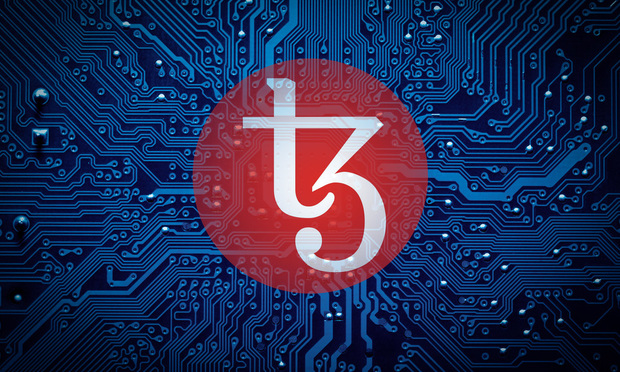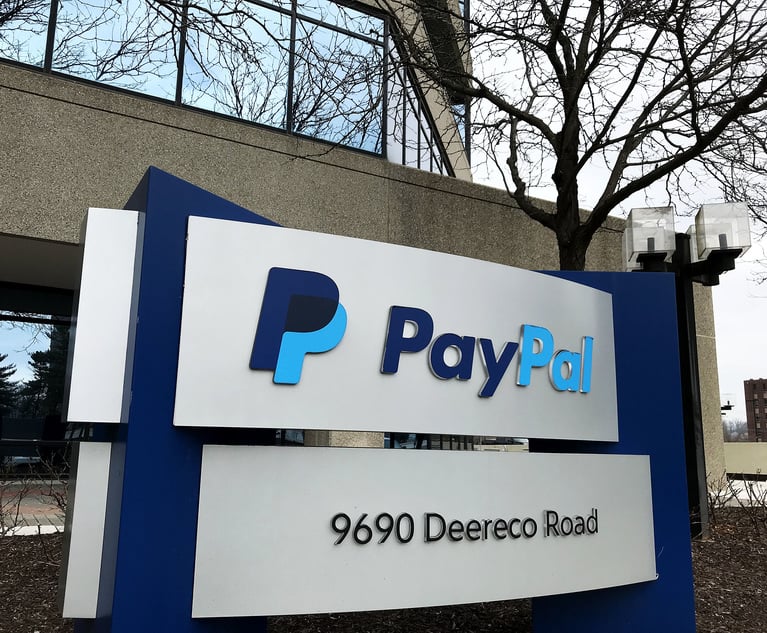Judge Gives Early Approval to $25M Class Action Settlement in Tezos ICO
"This is new terrain in this litigation, so that is also something to take into account," said U.S. District Judge Richard Seeborg of the Northern District of California in granting preliminary approval to the proposed deal to settle claims brought on behalf of investors who alleged that the initial coin offering on the Tezos blockchain violated U.S. securities laws.
April 30, 2020 at 05:48 PM
3 minute read
The original version of this story was published on The Recorder
 Tezos. Photo: Courtesy Photo
Tezos. Photo: Courtesy Photo
A federal judge has given preliminary sign-off to what appears to be a first-of-its-kind class action settlement involving an initial coin offering.
U.S. District Judge Richard Seeborg of the Northern District of California indicated during a hearing Thursday afternoon that he was granting preliminary approval to a $25 million proposed deal that the Tezos Foundation reached last month to settle claims brought on behalf of investors who claimed that the initial coin offering on the Tezos blockchain violated U.S. securities laws. Seeborg said during the hearing held via a Zoom videoconference that the settlement met the general parameters of "fair, reasonable and adequate" to move forward toward final approval.
"I do think my initial read certainly is that it is a solid settlement and one that I think we'll be able to proceed forward with," said Seeborg, noting that he would follow up with a written order. "This is new terrain in this litigation, so that is also something to take into account," the judge said.
Lead plaintiffs counsel at HGT Law and Block & Leviton filed court papers in March detailing the proposed deal to settle the class action brought on behalf of investors who claimed they lost money in the July 2017 ICO. The presale of so-called XTZ tokens offered on the Tezos blockchain raised the equivalent of $232 million in Bitcoin and Ethereum before the project was bogged down in delays and infighting at the Swiss foundation formed to promote it.
Block & Leviton's Jeff Block said during Thursday's hearing that although the claims administrator hired to reach out to the class estimated that about 7,500 members of the estimated 30,000-plus class would file claims, he thinks that notice will reach the entire class via emails on file with the Tezos Foundation, and that the claims rate could be higher. Block said that the $25 million settlement was better than the average 10% return that plaintiffs get on securities claims and that one factor motivating the deal was that the question of whether the XTZ offering qualified as a security under U.S. law was "very much uncertain."
Seeborg concurred saying that the parties did have much guidance about where he would land on the question of whether the tokens were securities, little guidance from the circuits, and no case on point from the U.S. Supreme Court on the issue.
Seeborg, who noted that the hearing was his first videoconference on a civil matter during the COVID-19 pandemic, said that he would set the final approval hearing for a Thursday in the latter half of August.
"I much prefer my grand courtroom but we have to adjust," said Seeborg, adding that he hoped the parties could meet in person next time.
This content has been archived. It is available through our partners, LexisNexis® and Bloomberg Law.
To view this content, please continue to their sites.
Not a Lexis Subscriber?
Subscribe Now
Not a Bloomberg Law Subscriber?
Subscribe Now
NOT FOR REPRINT
© 2025 ALM Global, LLC, All Rights Reserved. Request academic re-use from www.copyright.com. All other uses, submit a request to [email protected]. For more information visit Asset & Logo Licensing.
You Might Like
View All
NY AG James Targets Crypto Fraud Which Allegedly Ensnared Victims With Fake Jobs
4 minute read
CFPB Alleges Berkshire Hathaway Subsidiary Originated Unaffordable Housing Loans

Class Certification, Cash-Sweep Cases Among Securities Litigation Trends to Watch in 2025
6 minute read
'Biggest Influencer Scam of All Time'?: PayPal Accused of Poaching Commissions Via Its 'Honey' Browser Extension
Trending Stories
- 1Arbitrators Under Fire for Allegedly Forcing Workers to 'Stay or Pay' Employers
- 2Plaintiff Narrowly Avoids Dismissal Over Lengthy Complaint Filed in Federal Court
- 3Goodwin to Launch Brussels Office With Quinn Emanuel Antitrust Partner
- 4Looking to the Future of the FDA and Its Impact on Drug Regulation in 2025
- 5Pennsylvania Firms Join Partnership Promotion Parade
Who Got The Work
Michael G. Bongiorno, Andrew Scott Dulberg and Elizabeth E. Driscoll from Wilmer Cutler Pickering Hale and Dorr have stepped in to represent Symbotic Inc., an A.I.-enabled technology platform that focuses on increasing supply chain efficiency, and other defendants in a pending shareholder derivative lawsuit. The case, filed Oct. 2 in Massachusetts District Court by the Brown Law Firm on behalf of Stephen Austen, accuses certain officers and directors of misleading investors in regard to Symbotic's potential for margin growth by failing to disclose that the company was not equipped to timely deploy its systems or manage expenses through project delays. The case, assigned to U.S. District Judge Nathaniel M. Gorton, is 1:24-cv-12522, Austen v. Cohen et al.
Who Got The Work
Edmund Polubinski and Marie Killmond of Davis Polk & Wardwell have entered appearances for data platform software development company MongoDB and other defendants in a pending shareholder derivative lawsuit. The action, filed Oct. 7 in New York Southern District Court by the Brown Law Firm, accuses the company's directors and/or officers of falsely expressing confidence in the company’s restructuring of its sales incentive plan and downplaying the severity of decreases in its upfront commitments. The case is 1:24-cv-07594, Roy v. Ittycheria et al.
Who Got The Work
Amy O. Bruchs and Kurt F. Ellison of Michael Best & Friedrich have entered appearances for Epic Systems Corp. in a pending employment discrimination lawsuit. The suit was filed Sept. 7 in Wisconsin Western District Court by Levine Eisberner LLC and Siri & Glimstad on behalf of a project manager who claims that he was wrongfully terminated after applying for a religious exemption to the defendant's COVID-19 vaccine mandate. The case, assigned to U.S. Magistrate Judge Anita Marie Boor, is 3:24-cv-00630, Secker, Nathan v. Epic Systems Corporation.
Who Got The Work
David X. Sullivan, Thomas J. Finn and Gregory A. Hall from McCarter & English have entered appearances for Sunrun Installation Services in a pending civil rights lawsuit. The complaint was filed Sept. 4 in Connecticut District Court by attorney Robert M. Berke on behalf of former employee George Edward Steins, who was arrested and charged with employing an unregistered home improvement salesperson. The complaint alleges that had Sunrun informed the Connecticut Department of Consumer Protection that the plaintiff's employment had ended in 2017 and that he no longer held Sunrun's home improvement contractor license, he would not have been hit with charges, which were dismissed in May 2024. The case, assigned to U.S. District Judge Jeffrey A. Meyer, is 3:24-cv-01423, Steins v. Sunrun, Inc. et al.
Who Got The Work
Greenberg Traurig shareholder Joshua L. Raskin has entered an appearance for boohoo.com UK Ltd. in a pending patent infringement lawsuit. The suit, filed Sept. 3 in Texas Eastern District Court by Rozier Hardt McDonough on behalf of Alto Dynamics, asserts five patents related to an online shopping platform. The case, assigned to U.S. District Judge Rodney Gilstrap, is 2:24-cv-00719, Alto Dynamics, LLC v. boohoo.com UK Limited.
Featured Firms
Law Offices of Gary Martin Hays & Associates, P.C.
(470) 294-1674
Law Offices of Mark E. Salomone
(857) 444-6468
Smith & Hassler
(713) 739-1250








